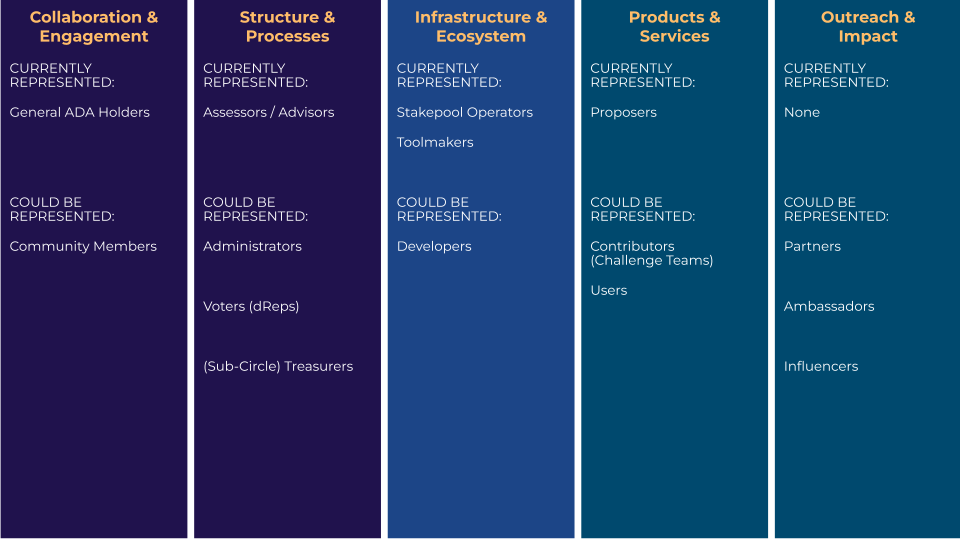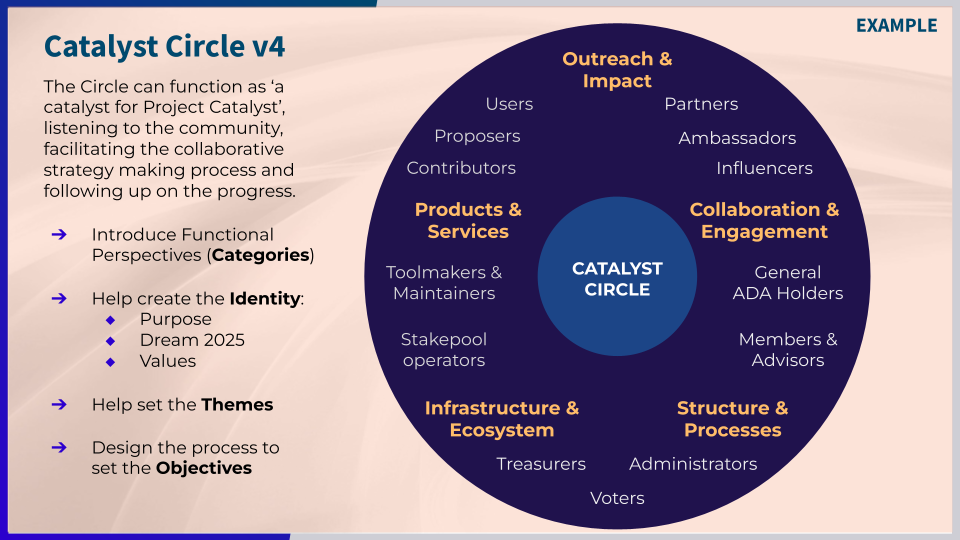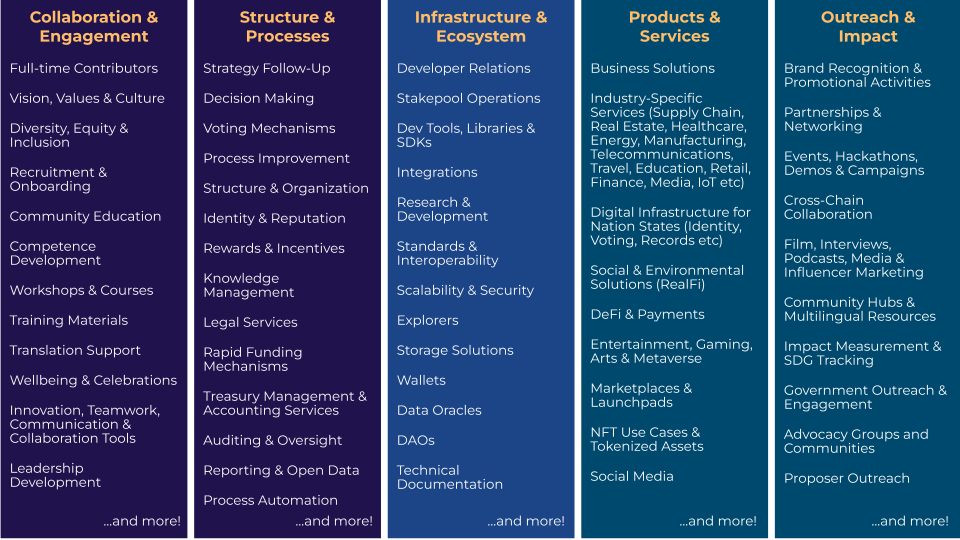Meeting #9, 7th July 2022
Meeting recording
Minutes of CCv3 Meeting #9
Present (in order of first speaking)
JP (facilitator); Felix Weber (representing CF); Tomi Astikainen (representing PAs); Harris Warren (IOG); Quasar (ADA Holders subcircle member); Steve Lockhart (Funded Proposers Subcircle, standing in for Mercy); Joey Chessher (Toolmakers and Maintainers); Rhys Morgan (stakepool operators); Peter Wolcott (secretary - present for first part of meeting only)
Speaker percentages
JP (34%), Harris (21%), Felix (13%), Joey (11%), Tomi (7%), Steve (6%), Quasar (5%), Rhys (2%)
Abbreviations used/Glossary
please scroll down
1. Opening, agenda
Check-in – conducted off-camera
Announcements – conducted off-camera. Felix announced special Circle Town Halls in CATH (Friday 8th July) & LatAm (w/c 11th July)
Agenda and align expectations – conducted off camera. JP asked for consent of the meeting to discuss Catalyst GPS.
2. Circle Stand-Up
Circle is no longer doing a Stand-up or addressing the Prioritised Problems Board. Summariser has asked when this decision was formally made, but did not receive an answer.
3. Consent agenda
Circle alignment with Catalyst GPS (off-camera)
The meeting decided to keep this discussion off-camera. It ran for c. 45 mins.
From Peter's in-meeting notes: discussion centred on how Catalyst GPS would like to shape the Circle to reflect their approach, replacing the current seats with “representative groups” as detailed in the following diagrams:
Key discussion points (taken from Peter’s summary): - Tomi has had conversations with George Lovegrove toward Funding Categories. Tomi renames some of the categories in his schema. - The F8 proposal Catalyst GPS https://cardano.ideascale.com/c/idea/398299 is dependent on Funding Categories “kicking in”. They hope to change existing Circle roles into new representation Categories more closely aligned to funding categories.
Joey: Kriss and Harris had some concerns in last meeting – what are their thoughts? Harris: Love the concept of funding categories; we will see how the challenge setting fund plays out. We need to make sure there is alignment between Circle and funding categories if there is intention to “lock in” Funding Categories in the Catalyst Fund Cycle. JP: Harris, how would you see the Circle’s role in Funding Categories? Tomi: Catalyst GPS agree with George on 90% of things; but we disagree with putting these categories forward as challenges instead of changing the mechanism to funding categories, due to the very likely possibility that only some of them get funded as challenges. Quasar: Split between changing the challenge setting to categories. Interesting exploring and experimenting. It mimics industrial classification. Wish we could change the F9 dApps Products and Integrations challenge to include services because there is no category for services. We need someone to look at the Challenges as a whole. A good controlled experiment (funding categories). Joey - if the circle grows too much in terms of number of representatives, coordination will become more difficult JP - Sounds like this discussion should turn into a working meeting on Hybrid Challenge/Funding Categories. Harris - Should we record, is the community going to be involved in this conversation? Tomi: the point of this is to talk about how the Circle wants to look at this. Steve: There is a need to organize an individual's thoughts, any sector of the Cardano Community. F10 is around the corner and we will have a surge of interest in Catalyst; we need to have the roadmaps in place to onboard and have clarity of all. Circle is likely to be the contact point for all of these disparate groups. Tomi – the new representative categories organise the background knowledge of Catalyst and point people to the sub-groups that form for different Catalyst information banks. JP - Sharing this information is critical Joey - Decisions that affect the community as a whole need to made by Circle or Rep body Tomi - I suggest we continue the conversation in a working group JP: looking to allow Felix & Rhys to speak Tomi: Circle should take notice of community thinking around process change. Felix: It's not the Circle’s job to make the decision; it's the community job to decide and the Circle’s job to produce a proposal for change and let the community decide. Rhys: no unique comments Steve: Tomi, is there is a more precise form of the Catalyst GPS conversation to share the idea broadly. Thinking that the whole community will show up at an ATH is naive, we need to push broader. Quasar - Great points. Don’t underestimate the community's assessment of Circle. Community still needs education on the functions of Catalyst.
Report-back on Circle After Town Hall 0n Weds 29th June (0:00)
NB Recording of the meeting begins here.
Room 1 (Felix, Tomi) – the objectives of Circle (0:58)
Tevo set up a Miro board https://miro.com/app/board/uXjVOnv0mNA=/
50 people in the conversation [Summariser’s note – only a handful of them spoke.]
Surprisingly positive feedback about Circle
It was suggested that Circle should have a connection to CIPs, or discuss them
People supported the need for a Circle as a sensor, even if it is not decision-making
People supported movement towards sub-circles, with Circle as a facilitator of community initiatives
Some wanted a regular Town Hall focused on Circle – maybe monthly?
Key points in discussion: Felix (4:45) The room did not actually answer the framing question “what is the objective of Circle?” There were several suggestions for possible objectives; Circle’s job now is to identify these, cluster them, categorise them, and then go back to the community and ask “is this what you meant?” Tomi (5:20) Feedback that we should avoid jargon like “human sensor array”. Many people did not know that Circle exists or what it is. Quasar (6:57) – Did this discussion legitimise Circle and prove that people want it? Tomi (7:29) From room 1 the overall impression is yes. Felix (7:48) We need tools to extract data from these conversations. Suggest Dework. JP (8:41) Tools and training, so people can use them. Tomi (11:36) There was a wish to make Prioritised Problems more visible – could be done during Circle TH slides and also in a regular ATH
ACTION ITEM: Felix & Tomi to write up idea for recurring Circle TH, to present to the IOG team that runs TH
Room 2 (Kenric, Joey) – funding the Circle (17:13)
14 people in the room, and most people spoke.
Kenric showed spreadsheets to demonstrate 3 different possible methods of funding Circle: - via proposals - 2nd price auction - negotiation, based on commercial-world salaries
There was also discussion of how many hours Circle reps really work
Also – can anyone be a Circle rep, or do reps need to have certain skills?
Key discussion points: Rhys (21:07) Relying on proposals has not played out well for us, so Kenric’s method could help guarantee compensation for reps. Harris (21:50) To decide fair incentives , need to define what Circle reps do: how many hours of work, whether there is only 1 person or several involved in a seat. Joey (24:05) Time commitment has increased - it’s now overwhelming, if you do it properly. JP (25:19) How would we guarantee we’ll get that level of professionalism? Tomi (26:02) We could have several Circles in different geographic areas; and we might need 2 people per seat to cope with the workload. Steve (26:35) We should pay the same regardless of where people live. Everyone should be valued equally, even if they live somewhere where the cost of living is lower. Felix (29:08) If there was no direct discussion in Room 2 of whether Circle should be funded by proposals, or via a parameter change, then we might need to revisit that.
ACTION ITEM: Joey and Kenric to create a document on the pros and cons of proposal-based funding vs. parameter change, with a view to putting the 2 options to the community in a referendum.
Room 3 (Harris and Quasar) – the vote for CCv4 (37:44 )
Between 23 and 30 people attended. We put forward some options for how the vote could be conducted, but didn’t stay on topic enough.
We weren’t prepared enough for the discussion (Harris, 41:30)
Those present agreed with the idea of sub-circles.
Idea from Phil Khoo to have 2 Circles running parallel – one based on the existing structure, another a more radical experiment.
Key discussion points: Felix (43:40) Encourage reps to re-watch meetings, contribute to working documents, and remember what has been decided: being a rep is more than just showing up to meetings. Harris (47:19) We should give a retrospective from the 3 rooms in a future Town Hall. JP (48:08) Yes, and perhaps a follow-up activity to gather further information Joey (49:30) Yes, and perhaps also the results of the Pol.is poll. Steve (56:28) Can IdeaScale vote be “one person, one vote”? Harris (57:10) one-ADA-one-vote or one-wallet-one-vote are easier to do. JP (1:01:05) Need to discuss the threshold for legitimacy of a vote (in terms of numbers of people voting).
ACTION ITEM: Rhys, Harris, Quasar to write up an options analysis for the CCv4 vote ACTION ITEM: Quasar to organise high-level retrospective on the 3 rooms at Town Hall on 13th July ACTION ITEM: Quasar to send Pol.is poll to Danny for inclusion in Friday newsletter
Change to date and time of Circle meetings (1:01:45)
There is an IOG meeting that clashes with Circle, so should Circle meeting time be changed? Harris (1:03:04) Might be easier for IOG to reschedule. Rhys (1:04:00) May be good to move Circle to a Monday or Tuesday, before TH, so we can bring things to the community at TH soon after our meeting, instead of almost a week later.
ACTION ITEM: JP to send out a Doodle for possible time-slots on Mon and Tues.
4. Checkout and close
1:06 41 Checkout and closing remarks Felix 1:09:47 Reminder to reps that they should bring the content of meetings to their communities. 1:12:46 Meeting feedback form
Meeting ends 1:13:25
Key words from this meeting
Abbreviations used/Glossary
ATH – After Townhall, the breakout rooms after the regular Wednesday TownHall meeting
CA – Community Advisor, the old name for a role open to anyone in Catalyst, to assess proposals in each funding round - now renamed PA
CATH – Catalyst Africa Town Hall
CC – Catalyst Circle
CF – Cardano Foundation
CIP – Cardano Improvement Proposal https://cips.cardano.org
CTC, Catalyst Technical Council, a proposed body that will be appointed by IOG to be involved in bicameral governance alongside the Catalyst community.
Catalyst School – https://thecatalyst.school
CGO - Community Governance Oversight, a F7 and F8 funded proposal that has created a team to discuss and provide oversight of key Catalyst governance processes
dRep – delegation representative, a new role that will be introduced for Fund 10; people to whom a voter will be able to delegate their voting power. See the registration form
DID – Decentralised identifiers
ETH – Eastern Town Hall
Gimbalabs - https://gimbalabs.com/gimbalgrid
GPS or Catalyst GPS – a fund 8 Catalyst funded proposal led by current and ex Circle members Nadia and Tomi https://cardano.ideascale.com/c/idea/398299
IOG – Input/Output Global
LatAm – the Catalyst community in Latin America. Comprises a regular Town Hall and several other community initiatives.
NFT – non-fungible token
PA - Proposal Assessor, the new name for the role that used to be called CA
PACE – "Projects Accelerating the Catalyst Ecosystem": Catalyst organisation that has pioneered funding categories
PBL – project-based learning
QA-DAO – Quality Assurance Distributed Autonomous Organisation
SPO – stakepool operator
VCA – Veteran Community Advisor, the old name for a Catalyst role open to those who have been a CA in previous rounds, to assess the CAs’ reviews
VPA - Veteran Proposal Assessor; the new name for the role that used to be called VCA.
Voltaire – the next phase on the Cardano roadmap to decentralisation
Appendix
Intelligent-verbatim transcript of this meeting
Agenda for this meeting
coming soon
Last updated


